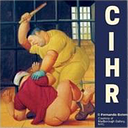EncroChat Part 2: Protecting Human Rights in Multinational European Criminal Investigations
This blog post by Dr. Carsten Momsen continues the discussion of EncroChat in Joya Stindt’s post on privacy and human rights and illustrates the challenges of AI’s use in criminal prosecution in his recent white paper for the CIHR AI Team.
The European perspective sheds light on the protection of fundamental and human rights in the context of multinational investigations in Europe. In 2014 the directive 2014/41/EU of the European Parliament and of the Council introduced the European Investigation Order in criminal matters (EIO) to European Prosecutors. Designed to strengthen cross border investigations within the EU, a European Investigation Order (EIO) is a judicial decision which has been issued or validated by a judicial authority of a Member State (‘OG the issuing State’) to have one or several specific investigative measure(s) carried out in another Member State (‘the executing State’) to obtain evidence in accordance with this Directive.
If, as in the case of Encrochat data, the country of origin (France) does not inform the country to which it transmits the data of the exact manner in which the data were obtained, For example, it is not known how and against whom investigations were conducted in France for which crimes, questions arise as to the usability of this evidence in the specific context of the protection of the fundamental rights of the accused in the country that receives the data and uses it for its own investigations. The EIO is based on the principle of mutual trust in which the recipient country trusts that the country in which the evidence was collected has acted lawfully.
On the one hand, it must be taken into account that the requirements for investigations in the countries of the EU are not uniformly regulated and that differentiated standards exist. This creates the danger of so-called forum shopping, i.e. a public prosecutor’s office trying to have the evidence collected in the country with the lowest standards for the investigative measure in question and thus circumventing its own standards for the rights of the accused.
In addition, it is questionable how these issues are to be reviewed if the original investigative measure is not disclosed and in this respect reference is made to reliance on the other state.
Regarding the defendant´s rights the following questions arise:
- Is an EIO order permissible even if it is made on the basis of criminal proceedings brought unlawfully under the national law of the Member State?
- Is an EIO order also admissible if its purpose is to obtain a sufficient factual basis for the commencement of future criminal proceedings?
- Is it also possible to order an EIO on the basis of criminal proceedings which are based on a purely fact-related initial suspicion without reference to persons?
- Is it permissible to order an EIO if this is done on the basis of criminal proceedings that have been instituted unlawfully?
These questions engender even more questions concerning the applicability of the European Charter of Fundamental Rights (CFR) in criminal proceedings:
- Are Art. 7 CFR (respect for private and family life) and 8 CFR (protection of personal data) applicable in the event of an act of exploitation contrary to data protection law? In the scope of Art. 8 CFR in particular the impact of data accuracy concerns, whereas Art. 7 CFR could be violated by the transmission of data of private conversations of until then non-suspect persons.
- Art. 47 subsec. 2 CFR grants a fair trial and Article 48(2) CFR requires respect for the rights of the defense. Both Fundamental rights could be violated by the fact that without information about the origin and extraction of the data and the way in which it is processed, neither the quality nor the completeness of the data can be checked using algorithm-driven (ai) readout and selection criteria. Nor can the defense confront the investigators involved in these processes.
Incidentally, since Brexit, Britain is no longer part of the EIO-structure and cannot participate in such multinational investigations. In the British context then, there is therefore no longer any formal mutual trust in the legitimacy of investigations. However, it seems more than questionable whether the fundamental rights of defendants in British criminal proceedings will be better protected as a result. At the least, the guarantees of the Charter of Fundamental Rights of the EU and the fundamental rights of the Union as general principles of law no longer apply in the United Kingdom upon withdrawal.
